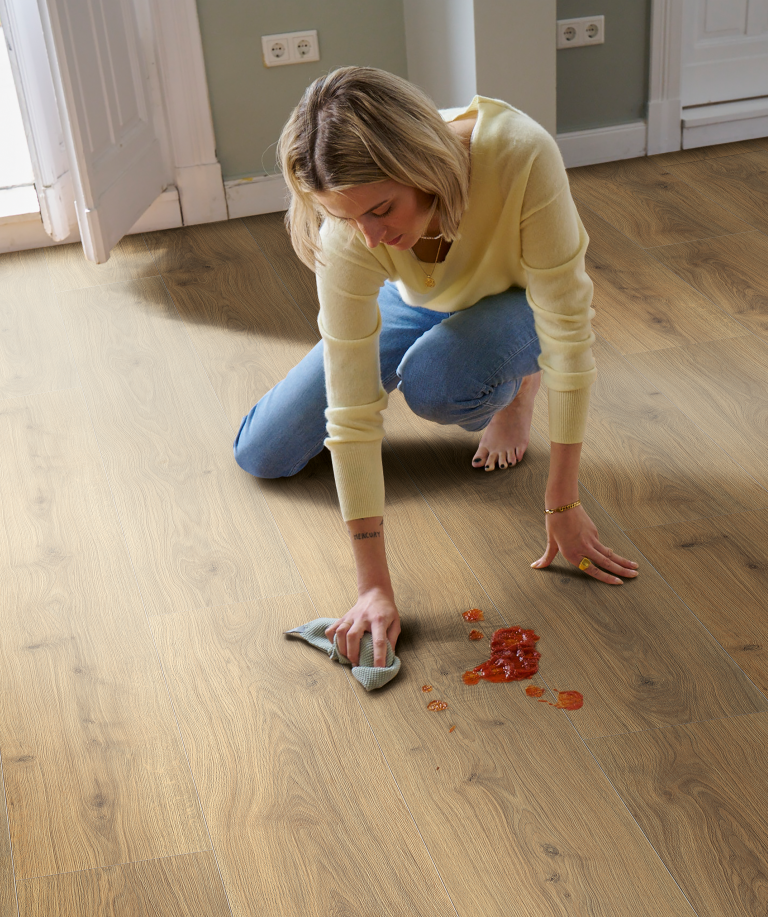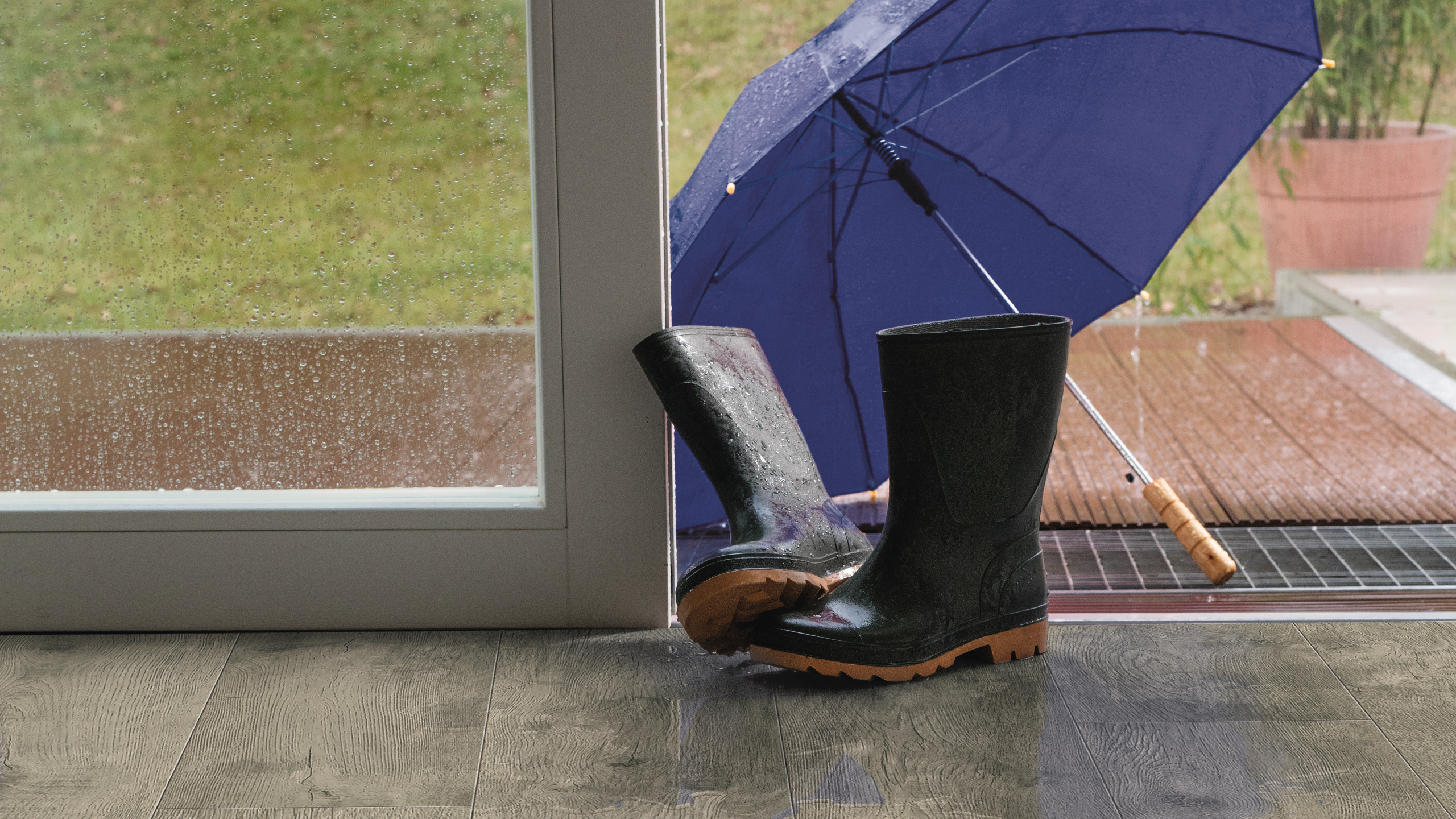Quite neat
With the right care, you can enjoy your HARO Enjoy your floor for a long time.
Optimum floor care preserves the value of your beautiful floor and is essential for you to enjoy it for a long time. Perfect floor care is no longer magic: especially on floor coverings with their HARO Floor coverings with their high-quality surfaces, as they are very simple, quick and easy to maintain. Dry cleaning with a broom, mop or hoover is all you need for regular maintenance. If coarser soiling needs to be removed or additional surface protection is required, wipe your floor covering with the recommended cleaning products from HARO with a damp cloth. That's it!
We also recommend preventative measures such as felt or Teflon furniture glides for long-term value retention and, if necessary, polycarbonate floor protection mats for chair castors in children's rooms or home offices. Dirt-trapping mats in the entrance area also help to prevent stones and coarse dirt from being carried into the living room.
A constant, ideal room temperature, which ensures a healthy living climate for people and floors alike, is also important: 20 degrees with a relative humidity of 50 to 60 per cent is ideal for wooden floors.
Optimum cleaning is of course just as important - right from the start. For your high-quality floor coverings such as parquet, laminate and designer flooring in particular, you should rely on optimally coordinated and ecologically safe care and cleaning products. We recommend for HARO Floors the cleaning series clean & green, which we have developed HARO Clean & green cleaning series developed by us.
Optimised for every floor type.
In order to optimally match the cleaning agent and care product to the floor covering, there is a combination of cleaner and care product in the modular system from HARO. We also recommend using our basic cleaner before intensive care. However, all cleaning products are almost identical in terms of application and the use of care accessories such as mops and buckets.
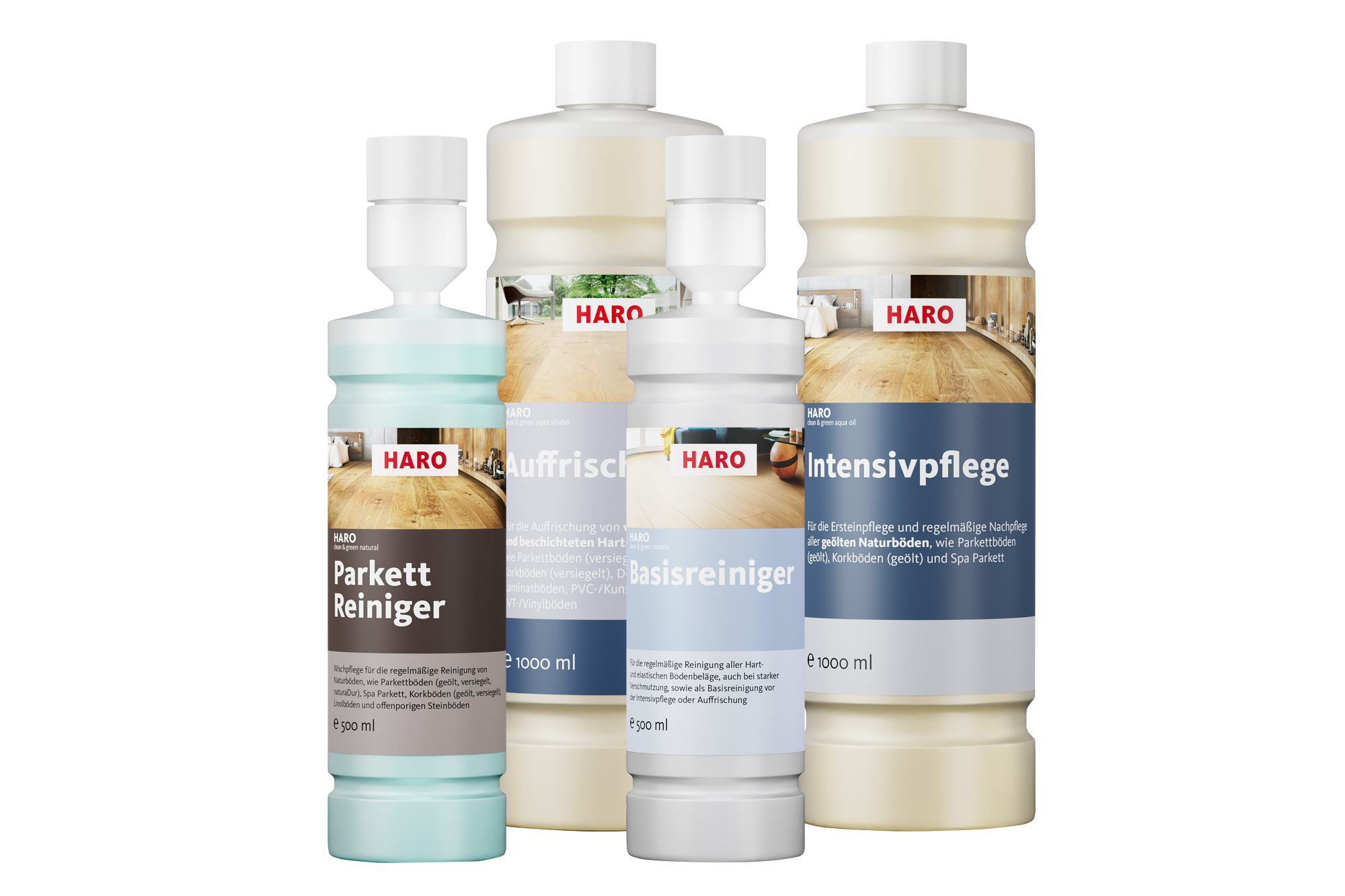
Parquet Floor Cleaning & Care
Are you the proud owner of a valuable and natural parquet floor? Then you are surely anxious to clean this wonderful floor in the best possible way.
Here you can see how easy parquet is to maintain.
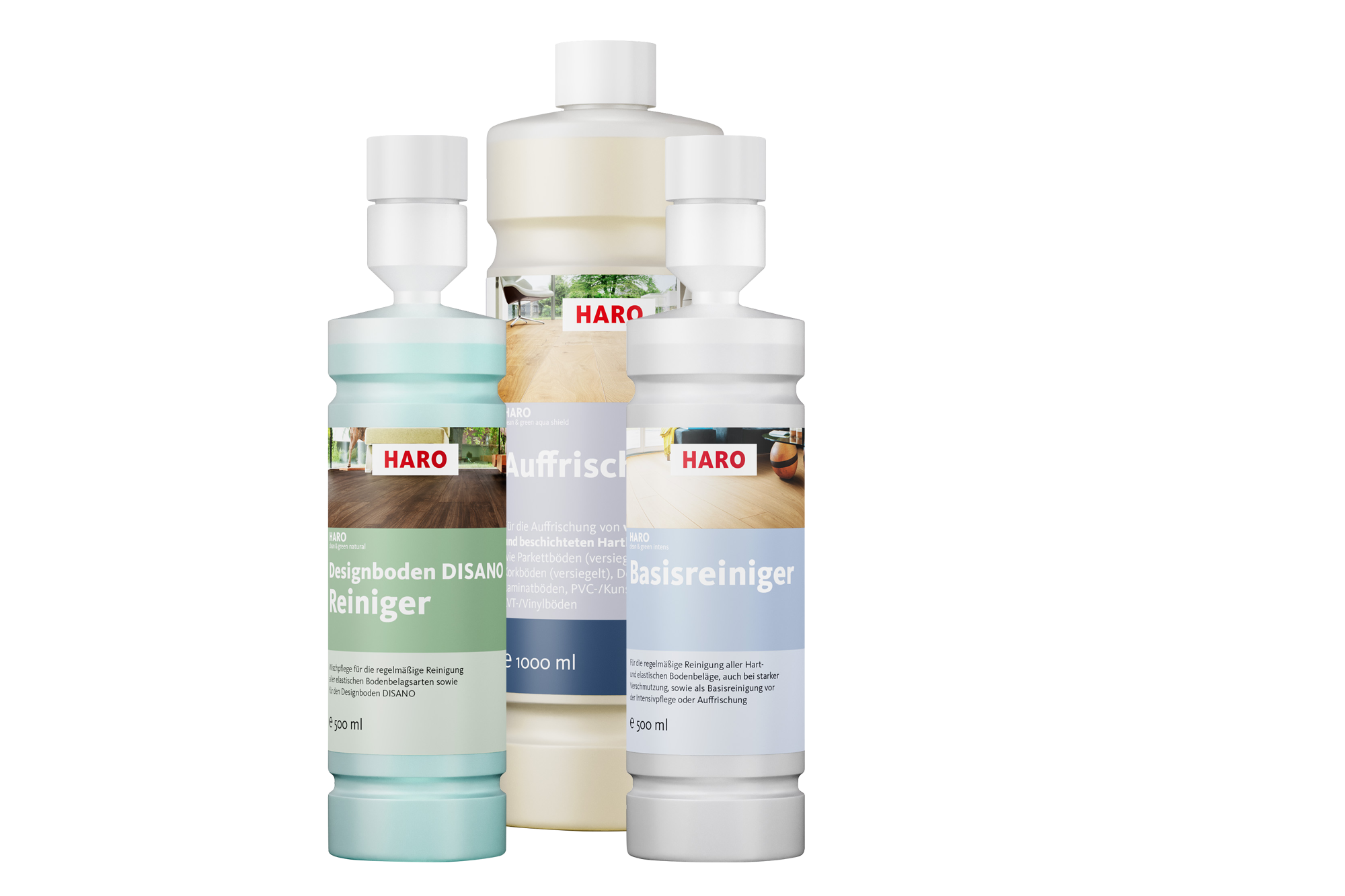
Design floor cleaning & care
Are you proud of your healthy and wonderfully versatile design floor? Then you will certainly be interested in how smart this all-rounder can be optimally cleaned.
Here you can see how to maintain design flooring.
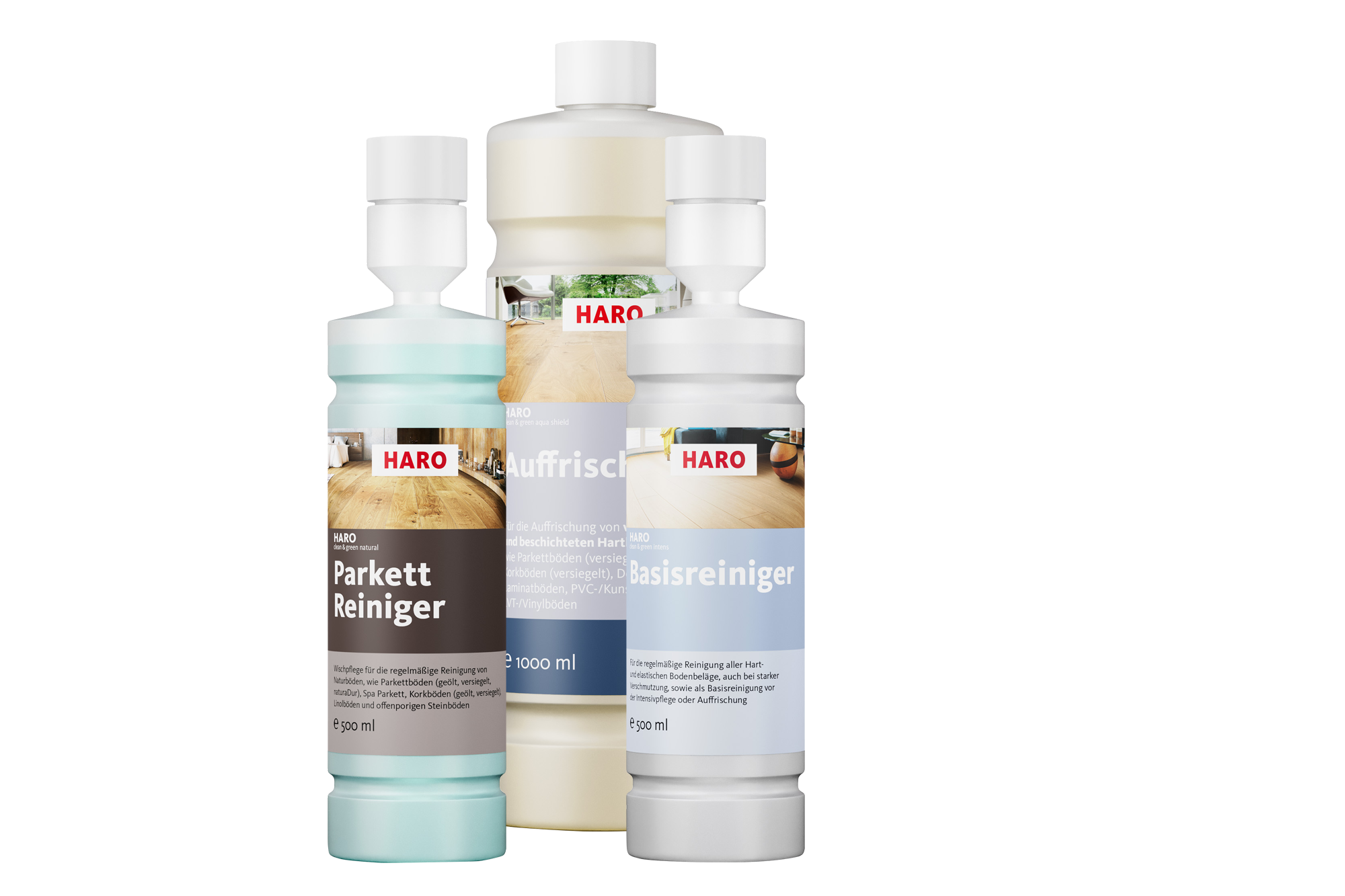
Cork Floor Cleaning & Care
Are you happy with your sustainable natural cork floor? Then you are certainly keen to preserve this natural wonder with optimal care.
Here you can see how easy cork is to care for.
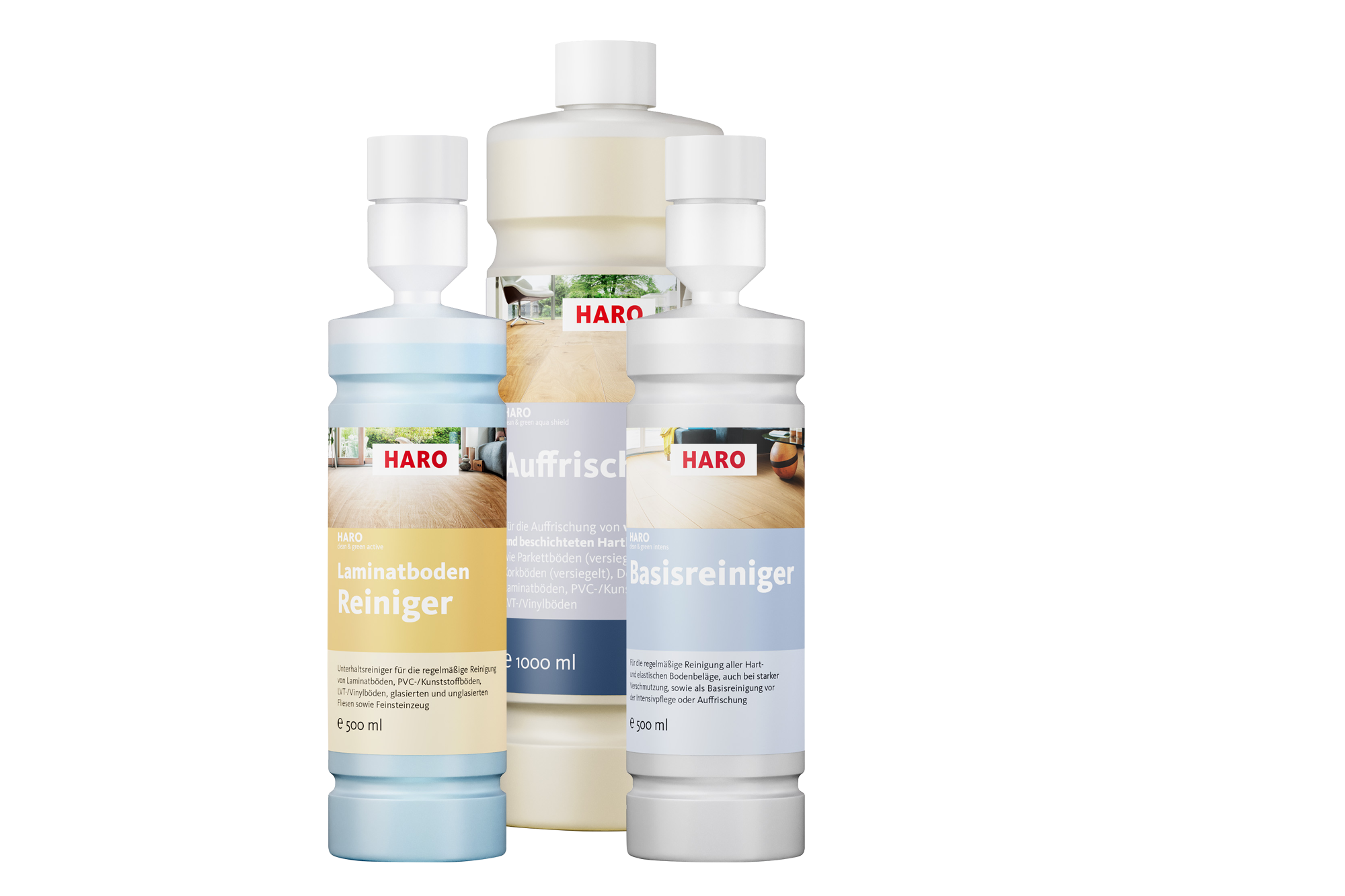
Laminate Floor Cleaning & Care
Are you enthusiastic about your robust, hard-wearing and beautiful laminate flooring? Then you'll be delighted at how easy it is to clean this all-rounder.
Tips & tricks: Wiping away cleaning myths and making a clean sweep.
1. Cleaning streaks: Where they come from and what really helps.
Use cold water to optimise the care of your floor. This is because cold water dries more slowly and evenly on the floor surface and also saves energy. This means there are no streaks or smears after mopping. That's why the cleaning system of HARO clean & green floor cleaner is designed for use in cold water.
What do I need to bear in mind when mopping on underfloor heating?
The heat that underfloor heating gives off to the floor also plays a decisive role here. This is because it dries too quickly and unsightly streaks and streaks can form again. Therefore, our tip: Switch off the underfloor heating when mopping the floor.
Why do I still have streaks after mopping?
You mop and even wipe, but streaks and streaks remain on your floor? If you have followed the first two tips, this is probably due to dirt particles in or on the floor or in the mop cover or mop cloth. Vacuum the surface before mopping and always wash your mop cover thoroughly before wiping your floor with cold water and a damp cloth.
I have washed the cleaning cloth in the machine, but streaks remain?
It is correct to wash the cleaning cloth or mop cover thoroughly in the machine. But please make sure that you do not add any fabric softener. This is because fabric softener, in combination with cleaning agents, can lead to unsightly streaking. Therefore: Always wash cleaning cloths without fabric softener!
I use extra cleaning agent, but still have streaks?
In addition to the points already mentioned, incorrect dosing of the floor cleaning agent is also a common problem. Modern and above all ecologically harmonised cleaning agents, such as our HARO clean & green series, are designed to achieve good cleaning performance with little concentrate. This helps the environment, but also saves cleaning agent costs. Therefore, make sure that you always follow the manufacturer's instructions for the dosage of your floor cleaner in order to achieve streak-free mopping results.
2. Good cleaning results: How much, how warm, how around?
When cleaning your floor coverings, a little water and the measured addition of detergent is enough. "A lot helps a lot" is an empty phrase that is definitely out of place when it comes to floor care. Wring out your cleaning cloth thoroughly or use modern cleaning buckets with appropriate systems. For wooden floor coverings, standing water should always be avoided and only damp mopping should be used.
Will my floor really get clean even if I damp mop it?
Yes, it will. Thanks to the special composition of modern cleaners and the use of appropriate mops, dirt is effectively removed from your floor even with little water.
How damp is "damp"?
You can think of damp as that light mist that settles on the floor or mirror after a long bath or shower. In relation to your floor mop cloth or floor mop cover, this means: wring it out, wring it out and wring it out again - so vigorously that hardly any water remains. This is the optimum wiper moisture level for floor cleaning.
How warm should the water used to clean the floor be?
As already mentioned, cold water is used for floor care. Modern cleaners are designed for this and water that is too warm or even hot can damage your floor. In addition, warm mopping water often leaves streaks and streaks. This is caused by the floor surface drying too quickly and unevenly.
What is the best way to mop my floor?
In general, the following applies: First remove all loose dirt, such as dust, with a hair brush or a hoover with a parquet nozzle. Then use a suitable bucket to prepare the recommended ratio of cleaning agent to water. Moisten the mop or mop cover and wring it out well, then damp-mop your floor evenly in overlapping strips in the direction of the floorboards. This will give you optimum cleaning results without streaks and without having to wipe again.
Our tip: Clean from top to bottom.
This means: first remove dust and dirt from shelves, worktops and tables and clean your floor at the end.
3. Cleaning myths and "life hacks": Does that help?
Whether you choose our clean & green series or other cleaning and care products, please refrain from using home remedies, "life hacks" and other obscure tips from the internet when caring for your high-quality brand floor.
Certainly, many home remedy tips promise streak-free results and a beautifully shiny floor. However, the ingredients can attack the surface of your flooring and ruin it. They can cause serious, permanent damage.
Does rinse aid from the dishwasher help against streaks when mopping floors?
As the name suggests, the place of use of a rinse aid is the dishwasher, where it ensures that glasses shine free of water spots. Dishwasher rinse aid is designed and optimised for ceramics and glass - it has no place in the water used to mop floors, however, as it is not designed for this purpose and can damage your floor.
Is shower gel an effective substitute for laminate cleaner?
No, definitely not! Shower gel is usually adjusted to the pH value of our skin. Shower and wash lotions are usually pH-neutral or pH-skin neutral. Fragrances and dyes also provide a great shower experience. However, you should spare your laminate floor this experience. The dyes used in shower gels can penetrate the surface of laminate and cause unattractive discolouration. Especially if the laminate floor has been improperly cleaned and the surface is already damaged.
Can I also wipe laminate with washing-up liquid?
Please don't do this - you don't bathe in washing-up liquid, even if an advertisement from days gone by might suggest otherwise. Dishwashing detergent is for washing dishes. Dishwashing detergent can attack the surface of your floor covering and lead to unsightly discolouration and grey haze. Dishwashing detergents also leach out your laminate flooring, so that it may have reached the end of its life after just a few years. So trying the supposedly inexpensive floor cleaner substitute becomes a costly mistake.
Can I avoid streaks if I spray the floor with glass cleaner?
Please don't try it! With the right floor cleaner and a clean, fabric softener-free mop, you can achieve streak-free mopping results even without using glass cleaner. Most glass cleaners contain methylated spirits or similar ingredients. Most glass cleaners contain spirit or similar ingredients to ensure streak-free window surfaces. However, these additives attack the surface of laminate, parquet and the like and can lead to irreparable damage. This is a high price to pay for a supposedly good tip, especially since modern floor cleaners ensure the best results with a low dosage.
Does fabric softener in the cleaning water provide a special shine?
Possibly, the addition of additives in the mopping water may leave a shiny layer on your parquet floor. But certainly not in the way you want. The fabric softener deposits deep in the pores of your floor and is difficult to remove. If you then use the wrong floor cleaner, which in the worst case reacts with the stored fabric softener, your floor will become unattractively discoloured and can usually no longer be freed from this discolouration. Especially with parquet, this mixture can penetrate deeply and damage your floor permanently.
In addition, fabric softener usually causes unsightly streaks after mopping. By the way, even if you only wash your cleaning cloth or mop cover with the addition of fabric softener (see above).
A splash of vinegar or vinegar essence never hurts, does it?
"We used to clean everything with vinegar cleaner!" - which may still make sense for cleaning bathrooms, is completely out of place when it comes to cleaning floor coverings. Every material needs care that is specially adapted to its properties. Especially with parquet or cork flooring, you should urgently avoid using vinegar cleaner. The surface becomes rough and cracked due to the acetic acid and can suffer irreparable damage.
I can get rid of any stain with bleach, can't I?
That is undoubtedly true - probably right along with the floor covering. What good is a stain removed if you need new flooring afterwards? The aggressive ingredients of bleach attack the entire material of your floor and damage it permanently. Therefore, refrain from using bleach or strong solvents and rather avoid stains on your floor right from the start.

